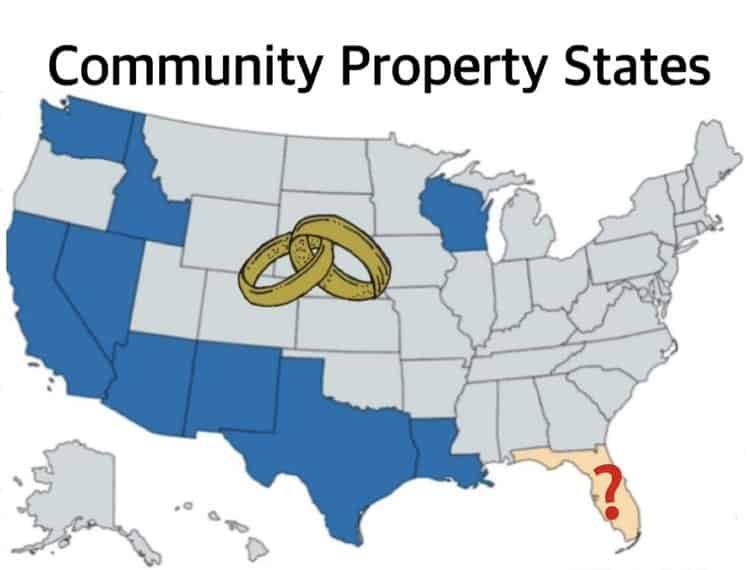Florida recently passed the Community Property Trust Act. According to the new law, you can now create a trust in Florida for which all property in the trust will be treated as community property. This is big news because Florida was not previously a community property state (with some exceptions if you moved to Florida from a community property jurisdiction). But this law provides a way for Florida residents to use the community property rules on their Florida property if they so desire.

What is community property?
Community property is a way that married couples can own shared assets. If you own an asset as community property, then each spouse owns half of that asset. The asset is not owned by one spouse; rather, in a community property jurisdiction, all property owned by a married couple is owned by both spouses equally. This means that when one spouse passes away, the deceased spouse can devise half of each community property asset. For example, if 100 shares of Apple stock are owned by two spouses as community property, then when the first spouse dies, that spouse’s last will and testament determines what happens to 50 of those shares.
For contrast, consider a different form of ownership call “tenants by the entirety.” This is how most married couples hold property in Florida. With tenants by the entirety, when one spouse passes away, the other automatically inherits the entire property. Tenancy by the Entirety ownership will even overrule a will that says the asset goes to someone else. Whereas with community property, the will (or trust, in this case) gets the final say.
Is Florida a community property state?

Florida does not automatically classify marital assets as community property, like some other states do. However, Florida allows married couples to opt in to community property ownership by placing assets into a community property trust. Thus, you only have community property in Florida if you intentionally set out to create community property.
Under the Florida Uniform Disposition of Community Property Rights at Death Act, Florida residents who moved to Florida from a community property jurisdiction are allowed to keep their community property classification at death for assets acquired under a community property jurisdiction. Residents moving from a community property jurisdiction can also use the cash proceeds from the sale of community property to purchase community property in Florida. However, the property is only treated as community property at death. And to take advantage of this law, you must be able to clearly trace the new community property asset to the proceeds, which then must be traced to the old community property asset. In other words, you have to be able to prove that the money from the sale of first property was used to buy the second.
In addition, all married couples in Florida may now create community property by simply creating a community property trust. Under Florida law, if married couples move property into a community property trust, that property will then become community property. However, this only applies to the property moved into the trust. Just creating the trust does nothing. You must move assets into the trust in order to create the community property. This law allows any married couple the ability to opt into community property ownership in Florida.
Thus, Florida is not fully a community property state, but Florida does allow its residents to create community property under limited circumstances. And the community property trust act just expanded those circumstances, giving married Floridians a lot more flexibility.
Is there a tax benefit to moving my assets into a community property trust?
Yes, there probably is a tax benefit to moving your assets into a community property trust, as long as you are married and have assets that have appreciated in value. In fact, this tax benefit is the main reason Florida offers community property trusts to its residents.
To understand the potential tax advantage of moving your assets in to a community property trust, you must first understand a concept called “taxable gain.” If you and your spouse bought stock in Widget Company for $100 and sold that same stock a month later for $350, then you have $250 in taxable gain. You do not have to pay taxes on the $100 because you are only taxed on the increase in value. We call that increase in value “taxable gain.” And the $100 you paid for the property is called “basis.” When an item is sold for more than its basis, you pay taxes only on the gain, which is the difference between the amount of money you received for the item and the item’s basis.
With that in mind, consider what happens at death. When you die, all of your assets get a basis adjustment. The new basis of all your assets is the fair market value of the asset on the day of your death. Thus, if the assets appreciated, the item’s basis goes up, which means less or no taxes when the item is eventually sold. This basis adjustment is often called a “step up” in basis, and it can result in a huge amount of tax savings. Let’s take a look at an example to see this in action.
Example: Harry and Wilma are married in Florida and have no community property. They own a home together as tenants by the entirety (as most married homeowners do in Florida). When Harry dies, his half of the property receives a step up in basis. That means that If Wilma sells the property after, she will likely pay less in capital gains tax. The step up in basis can result in a lot of money saved. But Wilma only received the step up in basis for half the property (Harry’s half of the property). If Harry and Wilma had lived in a community property state, then Wilma would have received a step up in basis for the whole property! That likely would result in twice the tax savings.
This is why Florida is trying to add a means for its citizens to get community property. The idea is that you put your property in a trust that uses community property and then you get the full step up in basis and pay less in taxes. This gives you the flexibility to choose when you want the community property rules to apply and when you do not.
How is a community property trust created?
In addition to the normal requirements of creating a trust, a community property trust has to meet four requirements. First, the trust must expressly state that is a Florida Community Property Trust. Second, the trust must clearly state the consequences of creating community property and that those consequences may be extensive. Section 736.1503 of the Florida Statutes provides language that can be used in the trust document to satisfy this requirement. Third, at least one trustee must either be a trustee located in Florida or a corporate trustee that has the authority to act as a Florida trustee. Finally, both spouses must sign the trust.
Are there any disadvantages to using a community property trust?
Although community property trusts are a powerful way to potentially pay less in taxes, they also come with some disadvantages. The trusts are still a great estate planning tool, but like all things in life, you have to weigh the pros and cons before making the decision right for you. Using a community property trust has the following disadvantages:
1. Lack of Protection From Creditors
If your marital property is in a community property trust, then it by definition cannot be owned as tenants by the entirety. This is a disadvantage because tenancy by the entirety comes with a big asset protection benefit. If a creditor of one spouse attempts to come after assets held as tenants by the entirety, they will find that the assets are out of reach and safely in the hands of the spouses. Tenancy by the entirety protects assets from all creditors of either spouse individually. Unless both spouses owe money on the same debt (or both signed consenting to the debt), the tenancy by the entirety asset cannot be reached by the creditor. But you give that protection up by putting the asset in a community property trust.
Some people see this issue and think that the clear answer then is to forget about community property and instead create a trust that states all assets are held as tenants by the entirety. That way you keep all the asset protection benefits. However, this comes with its own downsides. First, tenancy by the entirety gets only half the step up in basis that community property gets, meaning the tax savings tend to be much better on community property. Second, Florida law is unclear about whether trust assets can be held as tenants by the entirety. To get the best of both worlds, you might only put assets with large amounts of appreciation in a community property trust and leave some other assets as tenants by the entirety with a pay on death designation into the trust. But whether this is a good idea for you depends on your need for creditor protection compared to the potential tax savings. Simply put, if asset protection is a concern for you, you should speak with an estate planning lawyer to determine what options work best for you.
2. Assets Become Marital Property
If you put your assets into a community property trust and later get divorced, you will almost certainly find that all assets in the trust are marital property. And if an asset is marital property, then it is subject to the judge’s determination of which spouse gets the asset. Compare this to non-marital property which belongs only to a single spouse and is not part of the asset splitting in a divorce. In other words, you should only put property in a community property trust that is already marital property unless you feel very secure in your marriage.
3. Uncertain Tax Consequences
As mentioned above, we do not know for sure whether the community property trusts will actually result in the full step up in basis. I personally think that the tax savings will hold and that the IRS is unlikely to even challenge the law, but there are no guarantees of this. It is possible that you put your assets in a community property trust and never get the promised tax benefit, which is less than ideal. All that being said, if you have assets with a significant amount of taxable gain waiting to be realized, you might find that the community property trust is worth the risk.
Should you use a community property trust?
When dealing with uncertainty in the law, you are forced to take a calculated risk. We handle this problem by explaining the options to our clients and by being honest with them about the uncertainties remaining in the law. For many people, a community property trust makes a lot of sense. However, you should be aware of the potential downsides before making your decision.
As you can see, there is no one-size-fits-all solution here. For some people, the potential savings are worth the risk, and for others, the asset protection benefits of tenants by the entirety ownership matter too much to try to save a little money on taxes. It all depends on what matters to you.

